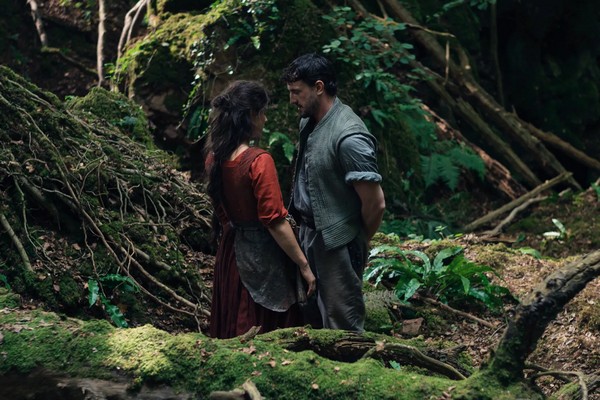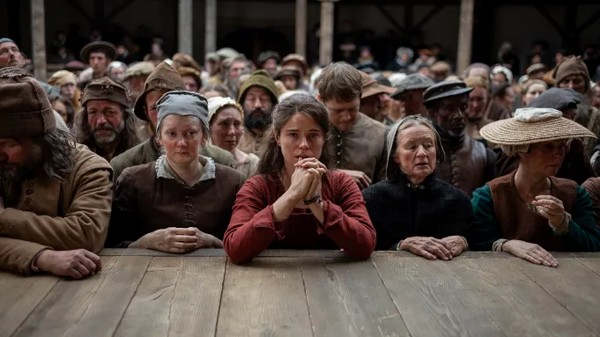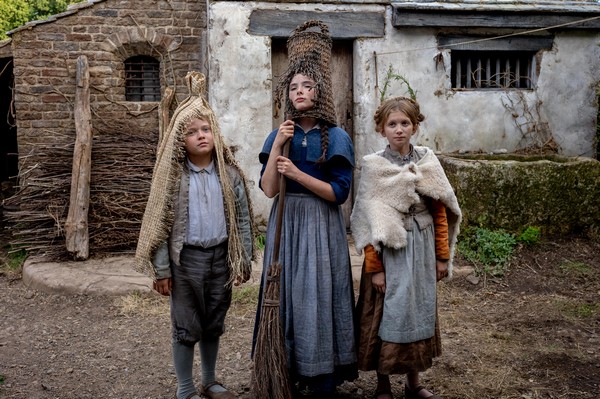 William Shakespeare, his wife Agnes, and their children deal with the ups and downs of life in the poignant and powerful Hamnet, directed by Chloe Zhou from the Maggie O’Farrell novel.
William Shakespeare, his wife Agnes, and their children deal with the ups and downs of life in the poignant and powerful Hamnet, directed by Chloe Zhou from the Maggie O’Farrell novel.
Hamnet is a quiet and tender movie that will breathe you into its essence, and tear you down in powerful, emotional movements. The drama of the lives and death of William Shakespeare and his family is one of the year’s most affecting films, finding a heartfelt truth of love and loss, of grief and recovery, from death. Director Chloe Zhou renders a beautifully composed capture of characters and their catharsis, based on the excellent book by Maggie O’Farrell, who co-writes the script with Zhou. (I also highly recommend O’Farrell’s The Marriage Portrait).
Looking at Zhou’s filmography, it’s not a surprise. The Rider, from 2017, and 2020’s Best Picture winner Nomadland both deal with intimate character portraits, shot beautifully, with a grounded realness in actions and emotions. Even Marvel’s The Eternals has pointed character pieces and a grounding, often lost within the extra muck (though I admit I like the movie more than most). She has a poignant and peaceful depth to her filmmaking, one that allows the characters, actions, and emotions to speak for themselves without a forced hand. Zhou is a confident filmmaker in her choices in craft, but in trusting the audience to come along with her.
This sentiment is profoundly stated with the visual design. Zhou and cinematographer Lukasz Zal, who specializes in quiet effectiveness as seen in Cold War, Zone of Interest, and I’m Thinking of Ending Things, set the tone in crafting astoundingly low-key compositions. The world of Hamnet resonates, sits still, and lets the viewer soak in the simple but engaging landscapes, rooms, and spaces (thanks to Fiona Crumble’s production design). The breathtaking portraits of the Elizabethan world ache with verisimilitude. The low-level, natural lighting, muddy streets, cracked houses, it’s lived in. Every creak of a floorboard, whistle of encroaching wind, lends reality.
 The same can be said of the performances, filled with remarkable emotion and pathos but never showy. For a movie circling a playwright, it’s never overwrought and overwrought. Never feels like a stage direction [cry]. Zhou has had a strength with characters and letting them breathe. There’s a quiet strength, but brimming with truth, life, and emotion. It’ a film that often finds its strongest beats in the quieter moments between lines and tears.
The same can be said of the performances, filled with remarkable emotion and pathos but never showy. For a movie circling a playwright, it’s never overwrought and overwrought. Never feels like a stage direction [cry]. Zhou has had a strength with characters and letting them breathe. There’s a quiet strength, but brimming with truth, life, and emotion. It’ a film that often finds its strongest beats in the quieter moments between lines and tears.
Jessie Buckley continues to be a ferocious performer; she exudes everything we need. Her Agnes informs as a powerful person of her own push, no matter what anyone else says, slightly witchy and always exactly who she is, Buckley gives Agnes one of her best in a string of great performances. Buckley is a force, and so is Agnes. Side note: while usually called Anne, her father’s will identified her as Agnes, but names were much more mutable then. Heck, Shakespeare himself wrote his last name in multiple ways over several documents, but that’s something you can look into later. Let’s not forget the title of this movie and the play that came from the actions of Hamnet vs Hamlet. She’s undoubtedly the center of the film, although brief chapters slide to others, in an odd way slightly unfocusing the film at points. She’s the heart of soul, existing wholly as her own fascinating portrait, more than a mere “wife of Shakespeare.”
Paul Mescal is just as wonderful as a foil in his William Shakespeare; haunted, enigmatic, and distant; it’s fascinating watching the pair work together with amazing chemistry. But as great as Buckley and Mescal are, relative newcomer Jacobi Jube performs well beyond his thirteen years. Did he steal Derek Jacobi’s Shakespearean soul when he borrowed his name? His large eyes welcome us into the depths of emotion deep within his soul (in a fitting casting choice, his older brother Noah plays the actor playing Hamlet on stage, lending an extra level of resonance). He holds his own with the poise of an old pro with powerhouses of Mescal and Buckley. The siblings of older sister Susanna and twin Judith might be lost in the mix of conversation, but they are well cast and performed, and the trio of kids has that sibling energy. Rounding out, Joe Alwyn and Emily Watson lend more texture as extended family.
All of the elements come together for the heartwrenching truth of it all. Hamnet works for not being a biopic of Wild Bill Shakes, but an honest reflection of the issues within a family. It’s a grounded (with maybe a touch of magical realism) family drama of what anyone might go through. Whether in the late 1500s or in 2025, we all have experienced or witnessed: marital issues not helped by a traveling husband, loneliness, financial troubles, sickness bubbling, in-laws biting, heart-tearing deaths, and the ways we process grief (sometimes it births a masterpiece). It just happens that this happened to William Shakespeare’s family.
 In a great touch, Shakespeare is only identified by name once in the film; honestly, I wish it wasn’t ever said as it’s a weird moment, nearly taking me out of the film when it does. If I recall correctly, the book never says it, but it’s been a few years. It’s no coy secret this is who we are watching, references to his works are abound; obvious Hamlet, but a great family moment of the kids, and The Scottish Play is a highlight.
In a great touch, Shakespeare is only identified by name once in the film; honestly, I wish it wasn’t ever said as it’s a weird moment, nearly taking me out of the film when it does. If I recall correctly, the book never says it, but it’s been a few years. It’s no coy secret this is who we are watching, references to his works are abound; obvious Hamlet, but a great family moment of the kids, and The Scottish Play is a highlight.
Zhou and Farrell are particular in the way they build the emotions and big moments. It moves at a ponderous, steady stream of moments until a wave crashes, bringing everything to the surface with an overwhelming, intense power. And when it does it hit, it hits hard. With each ebb and flow, the grieving builds until reaching a climax of catharsis. All of the emotional beats are welcomed and earned, authentic with the raw power.
I realize as I write this review, I’m using many of the same signifiers and thoughts in Hamnet as I did Train Dreams (I originally had a bit about reaching into one’s heart to caress it before tearing it out; until it occurred to me I had opened the review of Train Dreams with that sentiment). They share a core: they are quiet, poignant, emotionally fulfilling films overflowing with the beauty of people and places, simmering in their thoughts and actions.
With a bewitching Jessie Buckley at the center, Hamnet is an astonishingly beautiful film of high emotion and deep truths of family, life, and death. Through the lens of one of the most well-known names in English history, Hamnet will connect and emotionally devastate anyone who has felt grief from a too-personal loss.
